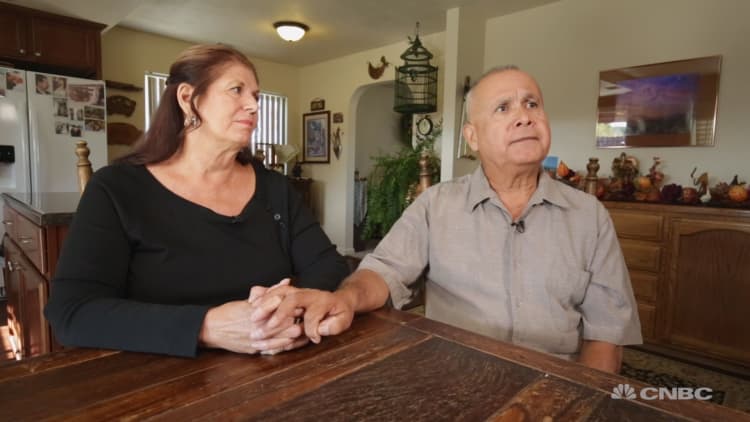Nearly half (43%) of people are hiding significant credit card debt from their partner, and 27% of millennials are currently keeping a financial secret from their significant other, more than any other generation.
That's according to TD Bank's 2019 Love and Money Survey, which gathered data from 1,753 respondents nationwide and weighted it by age, gender and region to reflect the population.
If you're in a committed relationship and are deliberately keeping quiet about your credit card debt (or any other money discrepancies), experts agree that this is not a good move — for you or your S.O.
"Hiding money secrets is not productive," says Aaron Graham, a certified financial planner at Abacus Planning Group. "Relationships are built on trust, and violating that trust is not only bad for the relationship but unfair to your partner."
Although 31% of millennial respondents say they'd consider breaking up with their partner over financial deception, money experts don't think you need to take such drastic measures. Here are five steps to help you and your partner have more open and honest conversations about your finances.
1. Have the money talk
Discussing finances can feel uncomfortable (and sometimes, downright invasive) — but experts say this is an essential part of getting on the same page with your partner.
Hiding money secrets is not productive. Relationships are built on trust, and violating that trust is not only bad for the relationship but unfair to your partner.Aaron GrahamA certified financial planner at Abacus Planning Group
By having a money talk with your significant other, you can learn about the other person's relationship with money, including how they feel about their finances and what their spending habits are like. Additionally, taking the time to sit down and learn about the other person's financial status allows you the opportunity to ask personal money-related questions related to how much they earn, what their credit score is and whether they have debt.
Since this can be a tough discussion to navigate, here is a checklist of questions to cover, courtesy of Kristin O'Keeffe Merrick, a financial advisor at O'Keeffe Financial Partners:
- How much debt do you carry?
- How much money do you have in savings?
- Are you saving for retirement?
- How do you think, feel and act when it comes to money?
- What are your spending habits like? (i.e. Do you tend to overspend or are you more frugal?)
- Do you stress too much about money?
And, remember, transparency is key when having your first in-depth money talk together. "Being honest with each other about everything – from money to feelings and beyond – is the foundation to a successful partnership," Graham says.

2. Set joint goals
Once you have an idea of where you and your partner stand financially, you can move onto goal setting.
"It's hard to start dreaming about your future if you don't know what you're working towards," says Priya Malani, founder and CEO of Stash Wealth.
Maybe it's your dream to buy a home, have a family or to travel together in the future. Whatever your aspirations, it's important that you articulate them, set a timeline for achieving them and map out the financial steps it will take to get there.
Creating this road map toward reaching your goals together can sometimes serve as the wake-up call that you or your significant other needed, explains Marguerita Cheng, a certified financial planner and CEO and co-founder of Blue Ocean Global Wealth.
"Once each spouse or partner can understand the impact their decisions have on reaching their goals, they are more likely to commit to their goals," Cheng says.
3. Schedule check-ins
Once you've started the conversation and set some goals, it's time for you and your partner to put regular money check-ins on the calendar.
"The most useful tool I have seen couples use to create or maintain a healthy relationship around money is a regular check-in," Graham says. "Having a regular meeting with your spouse about your money situation can make sure lines of communication remain open so each partner knows he or she has an open forum to discuss issues, questions or make goals together."
How often you choose to have these check-ins is up to you and really depends on your preferences. If reaching your financial objectives is time-sensitive, you may want to meet on a weekly basis. But if you're collectively aiming for more long-term ambitions, bi-weekly or monthly, is likely sufficient.

"My wife and I target weekly meetings to discuss what happened with our money since our last meeting, where we are that week and what our future items for discussion will be," Graham says.
4. Commit to transparency
When sharing your finances (and your life) with another, it's important that you "commit to transparency," Cheng says.
That means telling your spouse the truth (and the whole version of the truth) when discussing the state of your financials in the beginning — and continuing to do so throughout the relationship.
"Being open and honest is the foundation of creating financial harmony in a relationship," Cheng says. "Full disclosure includes sharing details about debt, credit scores, bank balances and spending habits. When taking this essential first step, it's crucial to listen without judgment in order to gain a clear understanding of your financial situation."
5. Try to understand your partner (and their motives)
In addition to listening without judgement, attempting to understand the "how and why" behind your partner's financial decisions can also help you to communicate more effectively.
"Like it or not, your approach to money is often strongly influenced by your parents and a lifetime of experiences that molded you," Cheng says. "If you grew up wealthy, your outlook is probably quite different than that of someone who grew up economically disadvantaged."
That's why, when trying to meet in the middle financially, it's important that you both "make a point of trying to understand your motivations, as well as those of your partner," Cheng says. "What may seem thoughtless, selfish or strange may simply be the way things were always done to them."
Like this story? Subscribe to CNBC Make It on YouTube!
Don't miss:
- Want a happy marriage? I've counseled 1,000 couples — and this is the best way to fix your money problems
- 7 money mistakes millionaires like Warren Buffett and Bill Gates never make—that average people do all the time
- I took Yale's 'most popular class ever'—and it completely changed how I spend my money
- People are 10 times more likely to break up with their partner if they have this quality



